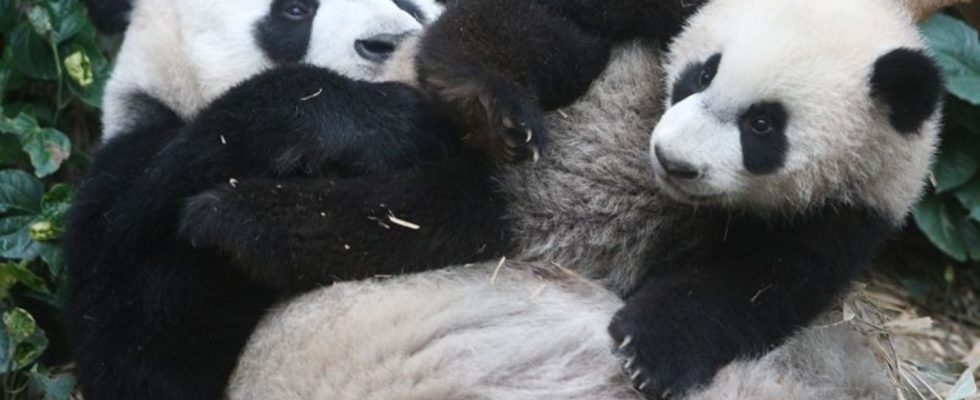strategy
Pandas and Flowers: How Asia Practices Charming Diplomacy
The pandas “Le Le” and “Jia Jia” at the River Wonders Wildlife Park in Singapore. photo
© Then Chih Wey/XinHua/dpa
Asia is bursting with exotic animals and plants – and some countries are pursuing diplomacy with them. China gives away pandas, Thailand gives away elephants. And Singapore says it simply through the flower.
The People’s Republic is not the only country in Asia that wants to make friends with its native fauna (and flora) or impress foreign state guests. Singapore is also a master of charming courtship and practices so-called orchid diplomacy with its national flower. And Thailand has given elephants away as heavyweight ambassadors abroad to foster relations. However, this has already backfired – especially for the elephants.
But first back to the giant pandas, also known as the heraldic animal of the WWF. There are probably fewer than 2,000 individuals living in their natural habitat in isolated Chinese mountainous regions today. The animals are considered sex-poor and only reproduce very slowly. But in Beijing’s breeding programs, the offspring seem to be working.
Panda rental is expensive
And so the country has been pursuing politics for decades with the funny, bamboo-munching animals, which are intended to convey a positive image of China despite the sometimes harsh tones of the government. In the past, the black and white bears were given as gifts to well-disposed countries such as the Soviet Union or North Korea. They are now also being lent to the West.
The panda rent is said to be the equivalent of almost one million euros per year. But it’s worth it: the animals are an important visitor magnet for zoos all over the world. However, the rental contracts are limited, so there is a risk of negotiations about an extension before they expire – depending on how diplomatic relations between China and the respective country are currently. Because the People’s Republic can also let the agreements expire.
Pandas are a “national treasure” of China, says the Foreign Ministry in Beijing when asked. They are “envoys of friendship” and promote China’s cultural exchange with other countries.
With its pandas, China was able to make good weather in diplomatic tensions decades ago. A major breakthrough came in 1972, when the country under Mao Zedong handed over a panda to the zoo in Washington after US President Richard Nixon’s historic visit to Beijing. At the end of 2023, the issue in the US capital was more relevant than ever when the remaining pandas had to return to China due to the tense US-China relationship – and the enclosure remained empty for the first time in 50 years.
Elaborate breeding program in the research center
Germany also received two pandas, Meng Meng and Jiao Qing. In 2019, to the delight of many visitors to the Berlin Zoo, the couple had double offspring. The bundles of joy Pit and Paule then had to return to China as planned in December – just like Le Le from Singapore, who had been in quarantine since mid-December before the big VIP trip on a Boeing 747-400F. The young animals come to the panda research center in Chengdu, where an extensive breeding program is carried out. According to the operator, around 230 bears live in captivity there – more than anywhere else in the world.
Singapore relies on orchids
“Say it through the flower,” is probably what Singapore thought. When it comes to pandas, the small country may be in Chinese hands – but when it comes to orchids, no one can fool them. The magnificent “National Orchid Garden” in the middle of the botanical gardens houses the largest collection in the world and is a leader in the art of hybrid breeding.
When monarchs, ministers or heads of state arrive, the government regularly launches a flowery charm offensive and names specially bred species after them – a very special honor. The colorful creations can be seen in the VIP Orchid Garden. “These famous hybrids promote goodwill and bilateral relations with friends of Singapore,” it said. There is a “Dendrobium Frank-Walter Steinmeier”, a “Papilionanda William Catherine”, a “Sealara Nelson Mandela”, a “Dendrobium Memoria Princess Diana” and countless other crosses with prominent names.
Elephants as a diplomatic gift
Things are more serious, but no less political, in other parts of Asia: elephants are revered as sacred in many countries on the continent and are traditionally given away to other countries as “goodwill ambassadors” – above all by Thailand. The elephant has been the national animal of the popular holiday destination since 1963.
However, the recipient nation is expected to treat the symbolic animals well. If this is not the case, diplomatic tensions can arise – as happened just last year. Animal rights activists discovered Sak Surin, who came from Thailand, on a temple site in Sri Lanka. He had to do hard work there and was in catastrophic condition.
Only after a long diplomatic tug-of-war was the government in Bangkok able to bring the giant home by charter flight for treatment at the Thai Elephant Conservation Center. “The incident affects good relations between the two countries,” a Sri Lankan politician said at the time. The prime minister said his government had formally apologized to Thailand. But bringing back an elephant that has been given as a gift is always considered an affront – no matter how much the animal suffered.
Around ten pachyderms given away by Thailand are currently still living in other countries, as Environment Minister Varawut Silpa-archa said last year. After protests from animal rights activists, Thailand stopped donating elephants three years ago.

